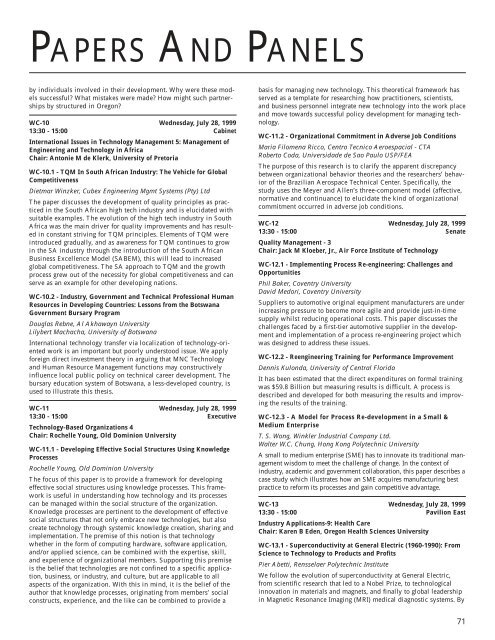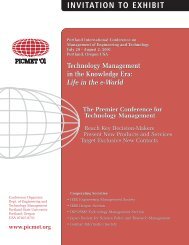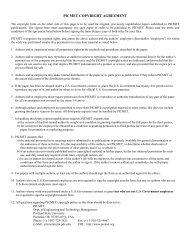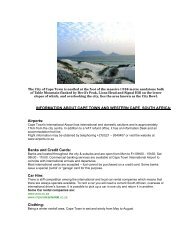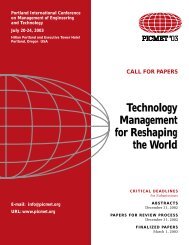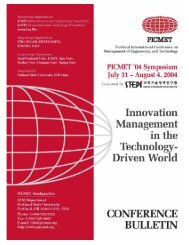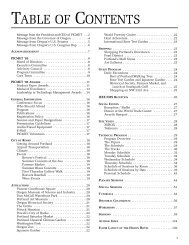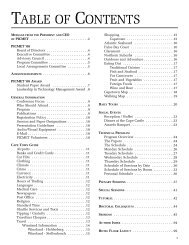Technology & Innovation Management: - PICMET Conference
Technology & Innovation Management: - PICMET Conference
Technology & Innovation Management: - PICMET Conference
You also want an ePaper? Increase the reach of your titles
YUMPU automatically turns print PDFs into web optimized ePapers that Google loves.
PAPERS AND PANELS<br />
by individuals involved in their development. Why were these models<br />
successful? What mistakes were made? How might such partnerships<br />
by structured in Oregon?<br />
WC-10 Wednesday, July 28, 1999<br />
13:30 - 15:00 Cabinet<br />
International Issues in <strong>Technology</strong> <strong>Management</strong> 5: <strong>Management</strong> of<br />
Engineering and <strong>Technology</strong> in Africa<br />
Chair: Antonie M de Klerk, University of Pretoria<br />
WC-10.1 - TQM In South African Industry: The Vehicle for Global<br />
Competitiveness<br />
Dietmar Winzker, Cubex Engineering Mgmt Systems (Pty) Ltd<br />
The paper discusses the development of quality principles as practiced<br />
in the South African high tech industry and is elucidated with<br />
suitable examples. The evolution of the high tech industry in South<br />
Africa was the main driver for quality improvements and has resulted<br />
in constant striving for TQM principles. Elements of TQM were<br />
introduced gradually, and as awareness for TQM continues to grow<br />
in the SA industry through the introduction of the South African<br />
Business Excellence Model (SABEM), this will lead to increased<br />
global competitiveness. The SA approach to TQM and the growth<br />
process grew out of the necessity for global competitiveness and can<br />
serve as an example for other developing nations.<br />
WC-10.2 - Industry, Government and Technical Professional Human<br />
Resources in Developing Countries: Lessons from the Botswana<br />
Government Bursary Program<br />
Douglas Rebne, Al Akhawayn University<br />
Lilybert Machacha, University of Botswana<br />
International technology transfer via localization of technology-oriented<br />
work is an important but poorly understood issue. We apply<br />
foreign direct investment theory in arguing that MNC <strong>Technology</strong><br />
and Human Resource <strong>Management</strong> functions may constructively<br />
influence local public policy on technical career development. The<br />
bursary education system of Botswana, a less-developed country, is<br />
used to illustrate this thesis.<br />
WC-11 Wednesday, July 28, 1999<br />
13:30 - 15:00 Executive<br />
<strong>Technology</strong>-Based Organizations 4<br />
Chair: Rochelle Young, Old Dominion University<br />
WC-11.1 - Developing Effective Social Structures Using Knowledge<br />
Processes<br />
Rochelle Young, Old Dominion University<br />
The focus of this paper is to provide a framework for developing<br />
effective social structures using knowledge processes. This framework<br />
is useful in understanding how technology and its processes<br />
can be managed within the social structure of the organization.<br />
Knowledge processes are pertinent to the development of effective<br />
social structures that not only embrace new technologies, but also<br />
create technology through systemic knowledge creation, sharing and<br />
implementation. The premise of this notion is that technology<br />
whether in the form of computing hardware, software application,<br />
and/or applied science, can be combined with the expertise, skill,<br />
and experience of organizational members. Supporting this premise<br />
is the belief that technologies are not confined to a specific application,<br />
business, or industry, and culture, but are applicable to all<br />
aspects of the organization. With this in mind, it is the belief of the<br />
author that knowledge processes, originating from members’ social<br />
constructs, experience, and the like can be combined to provide a<br />
basis for managing new technology. This theoretical framework has<br />
served as a template for researching how practitioners, scientists,<br />
and business personnel integrate new technology into the work place<br />
and move towards successful policy development for managing technology.<br />
WC-11.2 - Organizational Commitment in Adverse Job Conditions<br />
Maria Filomena Ricco, Centro Tecnico Aeroespacial - CTA<br />
Roberto Coda, Universidade de Sao Paulo USP/FEA<br />
The purpose of this research is to clarify the apparent discrepancy<br />
between organizational behavior theories and the researchers’ behavior<br />
of the Brazilian Aerospace Technical Center. Specifically, the<br />
study uses the Meyer and Allen’s three-component model (affective,<br />
normative and continuance) to elucidate the kind of organizational<br />
commitment occurred in adverse job conditions.<br />
WC-12 Wednesday, July 28, 1999<br />
13:30 - 15:00 Senate<br />
Quality <strong>Management</strong> - 3<br />
Chair: Jack M Kloeber, Jr., Air Force Institute of <strong>Technology</strong><br />
WC-12.1 - Implementing Process Re-engineering: Challenges and<br />
Opportunities<br />
Phil Baker, Coventry University<br />
David Medori, Coventry University<br />
Suppliers to automotive original equipment manufacturers are under<br />
increasing pressure to become more agile and provide just-in-time<br />
supply whilst reducing operational costs. This paper discusses the<br />
challenges faced by a first-tier automotive supplier in the development<br />
and implementation of a process re-engineering project which<br />
was designed to address these issues.<br />
WC-12.2 - Reengineering Training for Performance Improvement<br />
Dennis Kulonda, University of Central Florida<br />
It has been estimated that the direct expenditures on formal training<br />
was $59.8 Billion but measuring results is difficult. A process is<br />
described and developed for both measuring the results and improving<br />
the results of the training.<br />
WC-12.3 - A Model for Process Re-development in a Small &<br />
Medium Enterprise<br />
T. S. Wong, Winkler Industrial Company Ltd.<br />
Walter W.C. Chung, Hong Kong Polytechnic University<br />
A small to medium enterprise (SME) has to innovate its traditional management<br />
wisdom to meet the challenge of change. In the context of<br />
industry, academic and government collaboration, this paper describes a<br />
case study which illustrates how an SME acquires manufacturing best<br />
practice to reform its processes and gain competitive advantage.<br />
WC-13 Wednesday, July 28, 1999<br />
13:30 - 15:00 Pavilion East<br />
Industry Applications-9: Health Care<br />
Chair: Karen B Eden, Oregon Health Sciences University<br />
WC-13.1 - Superconductivity at General Electric (1960-1990): From<br />
Science to <strong>Technology</strong> to Products and Profits<br />
Pier Abetti, Rensselaer Polytechnic Institute<br />
We follow the evolution of superconductivity at General Electric,<br />
from scientific research that led to a Nobel Prize, to technological<br />
innovation in materials and magnets, and finally to global leadership<br />
in Magnetic Resonance Imaging (MRI) medical diagnostic systems. By<br />
71


